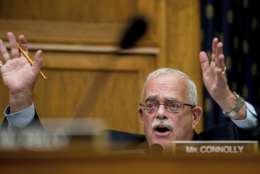Acquisition
-
The Small Business Administration is trying to address the 40% decline in the small business industrial base over the last decade with new initiatives.
July 26, 2022 -
The Defense Department has issued a request for information on a study of finance. Three years in development, the study is supposed to take a comprehensive look at financing and the financial health of the defense industrial base. Many contractors think the study is too narrow in scope.
July 26, 2022 -
CISA is about to get its own procurement authority but could they grow too large too fast? Alan Thomas, the former commissioner of the GSA's Federal Acquisition Service, now the chief operating officer of Intellibridge talked with Tom Temin on the Federal Drive.
July 26, 2022 -
The time is now to apply the TAA, consistent with the regulatory thresholds, to small business set-aside procurements where there is a waiver of the NMR.
July 22, 2022 -
The Biden administration has placed a greater focus on the impact of climate change than any administration to come before it. From climate research projects at the Energy Department and the Environmental Protection Agency to new sustainability requirements in General Services Administration contracts, climate change’s impact on federal procurement has only been increasing.
July 21, 2022 -
The government market is recession proof. But that doesn't mean contractors don't fight tooth-and-nail for federal business. Federal Drive host Tom Temin spoke about that with the leader at one of the major contractors: CEO of Peraton, Stu Shea.
July 19, 2022 -
A high ranking military official recently cited acquisition and the Defense supply chain in predicting mathematical certainty of the US losing out to China. That made contractors sit up and listen.
July 19, 2022 -
Although DLA and SBA have worked together on similar NMR waivers for many years, we recognize that SBA has recently taken exception to how the program has been implemented.
July 19, 2022 -
Rep. Gerry Connolly (D-Va.), chairman of the Oversight and Reform Subcommittee on Government Operations, wrote to GSA on July 15 seeking answers to why the transition to UEI has struggled.
July 15, 2022 -
The Air Force's deputy assistant secretary for Acquisition says the U.S.' “slow/micromanaged Cold War resource system" is the number one obstacle to competing and developing a military deterrent.
July 15, 2022 -
Allen Hill, the deputy assistant commissioner for Category Management in the Federal Acquisition Service at GSA, said agencies are moving toward managed services or the as-a-service model.
July 15, 2022 -
The Project on Government Oversight reviewed spending patterns of the Defense Logistics Agency under its Special Operational Equipment tailored logistics support program.
July 14, 2022 -
When it comes to federal contracts, Amazon seems to follow a simple three-word formula: protest, protest protest.
July 13, 2022 -
The Cybersecurity and Infrastructure Security Agency is continuing its fast evolution as a standalone department.
July 04, 2022 -
The General Services Administration lifted its two-month pause on the small business IT services governmentwide acquisition contract after updating the mentor-protégé requirements.
July 01, 2022










